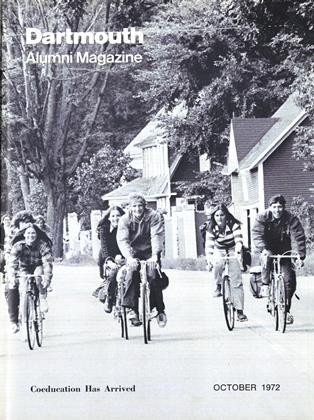HURRAH FOR PEACE, HOORAY FOR WAR: THE UNITED STATES DURING WORLD WAR I.
OCTOBER 1972 DAVID BOWMAN '63HURRAH FOR PEACE, HOORAY FOR WAR: THE UNITED STATES DURING WORLD WAR I. DAVID BOWMAN '63 OCTOBER 1972
Steven Jantzen'63. New York: Alfred A. Knopf, 1972.327 pp. $4.95.
Historical montage, this book reads like documentary film, a quick series of vivid pictures, voices, and life people in wartime. Instead of the usual digested facts, the ponderous parade of generalization plus supporting examples, it consists almostly entirely of original sources (letters, diaries, newspapers, songs, posters, and speeches) selected from enormous masses of material with a sympathetic and intelligent eye. This is revolution in historiography. If old historians follow Linnaeus cataloguing, classifying, and outlining, new historians, like Steven Jantzen, follow Einstein. They know that history, like nature, has only "order" and "meaning" when man imposes it by decree, whereas in reality there are only the rush and montage of events. And the variety of materials used suggests once again that there is no "subject" of history, because nothing can be excluded. History must be the sum of everything that has happened and everything that has not happened. There is, nonetheless, a conscious attempt to correct the serious imbalances seen in traditional views of the period. More attention is paid to the homefront where the real war was fought for political and economic motives, less to the trenches where nothing is real and no choices are possible. For the first time we realize that war had to be sold to the American people, who sensibly balked at getting involved; that opposition to the war was considerable and clearheaded; that the whipped-up enthusiasm for our involvement unleashed a torrent of intolerance and mob violence from which we have never recovered; and that many American Negroes got their first opportunities for a full participation in American life through being pressed into military service.
Attention to such aspects offers us corrective eyeglasses: we see the period clearly for the first time. The result is a balanced view, simply summed up in the book's closing sentences:
Was America's experience in World War I really the tragedy Ernest Meyer [a student anti-war protester] and others said it was? Or was it, as Theodore Roosevelt believed, a triumph of American idealism? History can do no more than ask the question.
The relevance of all this is considerable, given our present realization that involvement in another war has been sold to us from which we cannot profit in any way even if we "win" it. It took the first-hand horrors of two world wars to kill militarism in France, Germany, Great Britain, and Japan. Will it take a war at home to kill ours? Or can we do it by educating our children who have been trying to educate us? Books like this are a good start. Fortunately there is no liberal tub-thumping or breast-beating in this book. None is needed. The original sources speak for themselves.
Lecturer in Humanities at George Washington University, Mr. Bowman is enlarging hispolitical education by teaching State Department employees.
 View Full Issue
View Full Issue
More From This Issue
-
 Feature
FeatureBetting man's choice: Dartmouth. Then Harvard, Columbia, Cornell
October 1972 -
 Feature
FeatureVerdict on the Dartmouth Institute: A-OK
October 1972 By ROBERT B. GRAHAM '40 -
 Feature
FeatureCoeducation Becomes A Reality
October 1972 By MARY ROSS -
 Feature
FeatureHanover's "Host with the Most"
October 1972 By JAMES L. FARLEY '42 -
 Feature
FeatureHomage to the great god Pigskin: One hundred years of Ivy rivalry
October 1972 -
 Feature
FeatureNew Facilities in the Making
October 1972
DAVID BOWMAN '63
Books
-
 Books
BooksFaculty Publications
November 1934 -
 Books
BooksProfessor Gordon Ferrie Hull Jr. '37
February 1946 -
 Books
BooksTHE BOORN MYSTERY
November 1937 By H. H. Jackson -
 Books
BooksSEVENTY NEW POEMS.
JANUARY 1969 By JOHN HURD '21 -
 Books
BooksANCIENT GREECE AND THE NEAR EAST.
FEBRUARY 1966 By NORMAN A. DOENGES -
 Books
BooksSome Healthy, Some Lethal
October 1975 By ROBERT E. GOSSELIN




